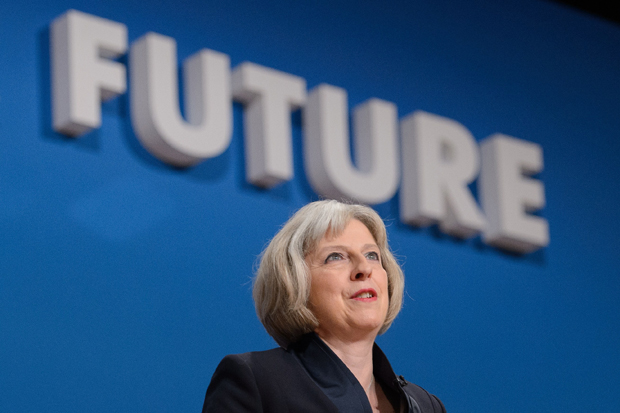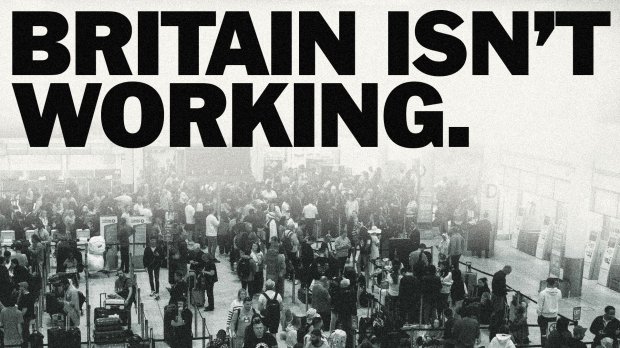If the Labour party conference in Manchester felt like a funeral, the Conservatives’ gathering in Birmingham had the air of a wedding. It had jazz bands, champagne bars and a near-universal mood of celebration — which is odd, given that every opinion poll and bookmaker reckons the Tories are on course to lose power next year. Almost every speech delivered from the floor was more substantial, forceful and credible than any delivered at the Labour party conference. And one of the highlights was the tour de force delivered by Theresa May.
For almost two decades the job of Home Secretary has been a political graveyard. Theresa May has made it into a power base. Several home secretaries tried to deport Abu Qatada; she succeeded. She is unafraid to confront the police, berating them for stopping and searching young black men without cause. She has championed the Modern Slavery Bill which, once passed, will give Britain the most advanced anti-slavery legislation in the world.
But there was one section of her speech that ought to alarm Conservatives — her proposed ‘extremism disruption orders’ which would ban organisations and individuals broadcasting certain views. We need to prevent people preaching ‘extremist views that we believe can create the environment in which violence becomes something that others wish to do’, she said. The Home Secretary’s job is to prevent crime. When the government extends its remit to include the prevention of views, it is time to worry.
The clear inference of her words is that people will soon find themselves on the wrong side of the law if they promulgate ideas which, though expressed in a peaceful fashion, are deemed to be extreme or inspire others to violence. This raises the clear risk that the right of free speech will apply only insofar as it is not deemed by an official to be appealing to some lurking hothead. It is not hard to see who could be caught up by such a law: not just Islamists playing recruiting sergeant for terror groups, but those advocating all manner of views which lie beyond mainstream public opinion. Labour’s ‘hate crime’ laws have already been used to pursue Christian street preachers criticising homosexuality and Englishmen being rude about Scots. This magazine was once contacted by the CID, which was ‘investigating’ an article about Islamic fundamentalism — the police were trying to establish if we had violated the parameters of argument defined by New Labour. Rather than repeal such laws, Mrs May seems to want to extend them.
Mrs May’s proposed new law is clearly aimed at Islamic extremists, who solicit no sympathy. But who else might be caught in the crossfire? Vegans assert that it is morally wrong for humans to perform experiments on other creatures — an extremist opinion by most people’s standards and one which has inspired animal rights activists to bomb the homes of scientists. Should they be gagged? And what about those demanding a united Ireland? Their words, even if devoid of any call to arms, could be said to contribute to an environment which has cost many hundreds of lives in terrorism.
Mrs May’s idea to clamp down on those who undertake activities ‘for the purpose of overthrowing democracy’ is reminiscent of the language used in authoritarian regimes. What about the remaining feudalists, Marxist revolutionaries and anarchists whose anti-globalisation protests might inspire the smashing up of McDonald’s? There might even be a case for outlawing the Conservative party on the grounds that it has resisted attempts to turn the House of Lords into a directly elected chamber.
Mrs May will doubtless dismiss such examples as fanciful, but that is what ministers always do when they are passing illiberal laws. The danger always lies in their misinterpretation. We have already seen Labour’s anti-terrorism laws used by councils to spy on parents whom they suspect of living outside the catchment area of their child’s school. A minister contemplating a law which imposes restrictions on freedom must have the imagination to foresee how the measures could be used and misused by over-zealous police officers and judges.
Like many bad laws, Theresa May’s proposals seem to have been unduly influenced by one case. Shortly after the murder of Lee Rigby in Woolwich in May last year, the Islamist preacher Anjem Choudary was asked on to the Today programme. Invited to condemn the murder, Choudary would not do so, choosing instead to blame it on British foreign policy. It was a misjudgment to give the preacher a prime-time slot, but does it really serve us to ban him and his type from the airwaves? The British approach has been to defeat bad ideas through argument rather than censorship, and to let neo-Nazism and its Islamic equivalent perish through contempt and ridicule, rather than be muzzled.
Mrs May has succeeded in bringing crime down to the lowest levels since surveys began 30 years ago, on a budget which keeps shrinking. Her admirers say she is set to become the greatest Tory home secretary in modern times — but only if she sets about repealing, rather than augmenting, Labour’s laws abridging freedom of speech. We do live in dangerous times, but the job of the home secretary is to reject as false the choice between our liberty and our security. This, after all, is the Conservative way.
Got something to add? Join the discussion and comment below.
Get 10 issues for just $10
Subscribe to The Spectator Australia today for the next 10 magazine issues, plus full online access, for just $10.
You might disagree with half of it, but you’ll enjoy reading all of it. Try your first month for free, then just $2 a week for the remainder of your first year.














Comments
Don't miss out
Join the conversation with other Spectator Australia readers. Subscribe to leave a comment.
SUBSCRIBEAlready a subscriber? Log in